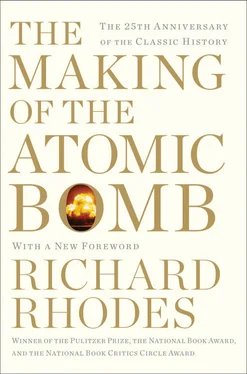There is something frantic in all this grinding, however disguised in traditional Harvard languor. Oppenheimer had not yet found himself—is that more difficult for Americans than for Europeans like Szilard or Teller, who seem all of a piece from their earliest days?—and would not manage to do so at Harvard. Harvard, he would say, was “the most exciting time I’ve ever had in my life. I really had a chance to learn. I loved it. I almost came alive.” 455Behind the intellectual excitement there was pain.
He was always an intensely, even a cleverly, private man, but late in life he revealed himself to a group of sensitive friends, a revelation that certainly reaches back all the way to his undergraduate years. “Up to now,” he told that group in 1963, “and even more in the days of my almost infinitely prolonged adolescence, I hardly took an action, hardly did anything or failed to do anything, whether it was a paper in physics, or a lecture, or how I read a book, how I talked to a friend, how I loved, that did not arouse in me a very great sense of revulsion and of wrong.” 456His friends at Harvard saw little of this side—an American university is after all a safe-house—but he hinted of it in his letters to Herbert Smith:
Generously, you ask what I do. Aside from the activities exposed in last week’s disgusting note, I labor, and write innumerable theses, notes, poems, stories, and junk; I go to the math lib[rary] and read and to the Phil lib and divide my time between Meinherr [Bertrand] Russell and the contemplation of a most beautiful and lovely lady who is writing a thesis on Spinoza—charmingly ironic, at that, don’t you think? I make stenches in three different labs, listen to Allard gossip about Racine, serve tea and talk learnedly to a few lost souls, go off for the weekend to distill the low grade energy into laughter and exhaustion, read Greek, commit faux pas, search my desk for letters, and wish I were dead. Voila. 457
Part of that exaggerated death wish is Oppenheimer making himself interesting to his counselor, but part of it is pure misery—considering its probable weight, rather splendidly and courageously worn.
Both of Oppenheimer’s closest college friends, Francis Fergusson and Paul Horgan, agree that he was prone to baroque exaggeration, to making more of things than things could sustain on their own. 458Since that tendency would eventually ruin his life, it deserves to be examined. Oppenheimer was no longer a frightened boy, but he was still an insecure and uncertain young man. He sorted among information, knowledge, eras, systems, languages, arcane and apposite skills in the spirit of trying them on for size. Exaggeration made it clear that he knew you knew how awkwardly they fit (and self-destructively at the same time supplied the awkwardness). That was perhaps its social function. Deeper was worse. Deeper was self-loathing, “a very great sense of revulsion and of wrong.” Nothing was yet his, nothing was original, and what he had appropriated through learning he thought stolen and himself a thief: a Goth looting Rome. He loved the loot but despised the looter. He was as clear as Harry Moseley was clear in his last will about the difference between collectors and creators. At the same time, intellectual controls were the only controls he seems to have found at that point in his life, and he could hardly abandon them.
He tried writing, poems and short stories. His college letters are those of a literary man more than of a scientist. He would keep his literary skills and they would serve him well, but he acquired them first of all for the access he thought they might open to self-knowledge. At the same time, he hoped writing would somehow humanize him. He read The Waste Land, newly published, identified with its Weltschmerz and began to seek the stern consolations of Hindu philosophy. He worked through the rigors of Bertrand Russell’s and Alfred North Whitehead’s three-volume Principia Mathematica with Whitehead himself, newly arrived—only one other student braved the seminar—and prided himself throughout his life on that achievement. Crucially, he began to find the physics that underlay the chemistry, as he had found crystals emerging in clarity from the historical complexity of rocks: “It came over me that what I liked in chemistry was very close to physics; it’s obvious that if you were reading physical chemistry and you began to run into thermodynamical and statistical mechanical ideas you’d want to find out about them…. It’s a very odd picture; I never had an elementary course in physics.” 459
He worked in the laboratory of Percy Bridgman, many years later a Nobel laureate, “a man,” says Oppenheimer, “to whom one wanted to be an apprentice.” 460He learned much of physics, but haphazardly. He graduated a chemist and was foolhardy enough to imagine that Ernest Rutherford would welcome him at Cambridge, where the Manchester physicist had moved in 1919 to take over direction of the Cavendish from the aging J. J. Thomson. “But Rutherford wouldn’t have me,” Oppenheimer told a historian later. “He didn’t think much of Bridgman and my credentials were peculiar and not impressive, and certainly not impressive to a man with Rutherford’s common sense…. I don’t even know why I left Harvard, but I somehow felt that [Cambridge] was more near the center.” 461Nor would Bridgman’s letter of recommendation, though well meant, have helped with Rutherford. Oppenheimer had a “perfectly prodigious power of assimilation,” the Harvard physicist wrote, and “his problems have in many cases shown a high degree of originality in treatment and much mathematical power.” But “his weakness is on the experimental side. His type of mind is analytical, rather than physical, and he is not at home in the manipulations of the laboratory.” Bridgman said honestly that he thought Oppenheimer “a bit of a gamble.” 462On the other hand, “if he does make good at all, I believe that he will be a very unusual success.” After another healing summer in New Mexico with Paul Horgan and old friends from the summer of 1921, Oppenheimer went off to Cambridge to attack the center where he could.
J. J. Thomson still worked at the Cavendish. He let Oppenheimer in. “I am having a pretty bad time,” Oppenheimer wrote to Francis Fergusson at Oxford on November 1. “The lab work is a terrible bore, and I am so bad at it that it is impossible to feel that I am learning anything…. The lectures are vile.” Yet he thought “the academic standard here would depeople Harvard overnight.” 463He worked in one corner of a large basement room at the Cavendish (the Garage, it was called); Thomson worked in another. He labored painfully to make thin films of beryllium for an experiment he seems never to have finished—James Chadwick, who had moved down from Manchester and was now Rutherford’s assistant director of research, later put them to use. “The business of the laboratory was really quite a sham,” Oppenheimer recalled, “but it got me into the laboratory where I heard talk and found out a good deal of what people were interested in.” 464
Postwar work on quantum theory was just then getting under way. It excited Oppenheimer enormously. He wanted to be a part of it. He was afraid he might be too late. All his learning had come easily before. At Cambridge he hit the wall.
It was as much an emotional wall as an intellectual, probably more. “The melancholy of the little boy who will not play because he has been snubbed,” he described it three years later, after he broke through. 465The British gave him the same silent treatment they had given Niels Bohr, but he lacked Bohr’s hard-earned self-confidence. Herbert Smith sensed the approaching disaster. “How is Robert doing?” he wrote Fergusson. “Is frigid England hellish socially and climatically, as you found it? Or does he enjoy its exoticism? I’ve a notion, by the way, that your ability to show him about should be exercised with great tact, rather than in royal profusion. Your [two] years’ start and social adaptivity are likely to make him despair. And instead of flying at your throat… I’m afraid he’d merely cease to think his own life worth living.” 466Oppenheimer wrote Smith in December that he had not been busy “making a career for myself…. Really I have been engaged in the far more difficult business of making myself for a career.” 467It was worse than that. He was in fact, as he later said, “on the point of bumping myself off. This was chronic.” 468He saw Fergusson at Christmastime in Paris and reported despair at his lab work and frustration with sexual ventures. Then, contradicting Smith’s prediction, he flew at Fergusson’s throat and tried to strangle him. Fergusson easily set him aside. Back at Cambridge Oppenheimer tried a letter of explanation. He wrote that he was sending Fergusson a “noisy” poem. “I have left out, and that is probably where the fun came in, just as I did in Paris, the awful fact of excellence; but as you know, it is that fact now, combined with my inability to solder two copper wires together, which is probably succeeding in getting me crazy.” 469
Читать дальше












